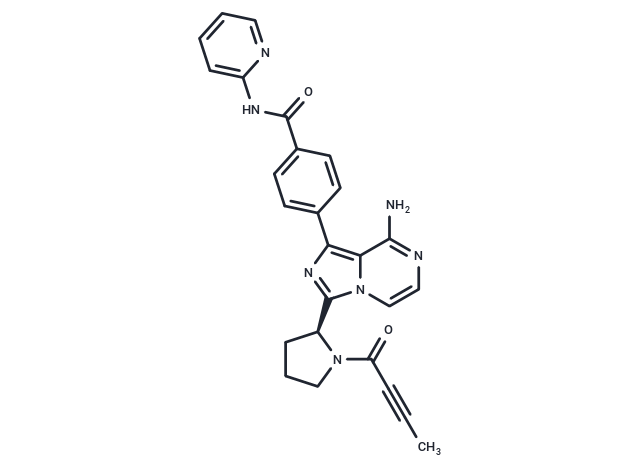- Remove All
 Your shopping cart is currently empty
Your shopping cart is currently empty
Acalabrutinib
Acalabrutinib (ACP-196), also known as ACP-196, is an orally available inhibitor of Bruton's tyrosine kinase (BTK) with potential antineoplastic activity. Upon administration, ACP-196 inhibits the activity of BTK and prevents the activation of the B-cell antigen receptor (BCR) signaling pathway. This prevents both B-cell activation and BTK-mediated activation of downstream survival pathways. This leads to an inhibition of the growth of malignant B cells that overexpress BTK. BTK, a member of the src-related BTK/Tec family of cytoplasmic tyrosine kinases, is overexpressed in B-cell malignancies; it plays an important role in B lymphocyte development, activation, signaling, proliferation and survival.

Acalabrutinib
| Pack Size | Price | Availability | Quantity |
|---|---|---|---|
| 5 mg | $39 | In Stock | |
| 10 mg | $55 | In Stock | |
| 25 mg | $75 | In Stock | |
| 50 mg | $97 | In Stock | |
| 100 mg | $155 | In Stock | |
| 200 mg | $239 | In Stock | |
| 500 mg | $395 | In Stock | |
| 1 mL x 10 mM (in DMSO) | $43 | In Stock |
Product Introduction
| Description | Acalabrutinib (ACP-196), also known as ACP-196, is an orally available inhibitor of Bruton's tyrosine kinase (BTK) with potential antineoplastic activity. Upon administration, ACP-196 inhibits the activity of BTK and prevents the activation of the B-cell antigen receptor (BCR) signaling pathway. This prevents both B-cell activation and BTK-mediated activation of downstream survival pathways. This leads to an inhibition of the growth of malignant B cells that overexpress BTK. BTK, a member of the src-related BTK/Tec family of cytoplasmic tyrosine kinases, is overexpressed in B-cell malignancies; it plays an important role in B lymphocyte development, activation, signaling, proliferation and survival. |
| Targets&IC50 | BTK:3nM |
| In vitro | When administered orally to mice, ACP-196 demonstrably inhibits the expression of CD86 in CD19+ spleen cells induced by anti-IgM in a dose-dependent manner, with an ED50 of 0.34 mg/kg. This inhibition exceeded 90% of CD86 expression levels after 3 hours post-treatment. |
| In vivo | Acalabrutinib does not inhibit EGFR, ITK, and TEC, and does not affect the phosphorylation of EGFR at the Y1068 and Y1173 sites. It has a higher IC50 value than ibrutinib and shows almost no inhibitory activity on the kinase activities of ITK, EGFR, ERBB2, ERBB4, JAK3, BLK, FGR, FYN, HCK, LCK, LYN, SRC, and YES1. In in vitro signal detection in primary human chronic lymphocytic leukemia cells, Acalabrutinib inhibits the tyrosine phosphorylation of downstream targets ERK, IKB, and AKT. |
| Alias | ACP-196 |
| Molecular Weight | 465.51 |
| Formula | C26H23N7O2 |
| Cas No. | 1420477-60-6 |
| Smiles | CC#CC(=O)N1CCC[C@H]1c1nc(-c2ccc(cc2)C(=O)Nc2ccccn2)c2c(N)nccn12 |
| Relative Density. | 1.37 g/cm3 (Predicted) |
| Storage | keep away from moisture,keep away from direct sunlight | Powder: -20°C for 3 years | In solvent: -80°C for 1 year | Shipping with blue ice. | |||||||||||||||||||||||||||||||||||
| Solubility Information | Ethanol: 53 mg/mL (113.85 mM), Sonication is recommended. DMSO: 86 mg/mL (184.74 mM), Sonication is recommended. | |||||||||||||||||||||||||||||||||||
Solution Preparation Table | ||||||||||||||||||||||||||||||||||||
Ethanol/DMSO
| ||||||||||||||||||||||||||||||||||||
Calculator
In Vivo Formulation Calculator (Clear solution)
Dose Conversion
Tech Support
Keywords

Copyright © 2015-2025 TargetMol Chemicals Inc. All Rights Reserved.



